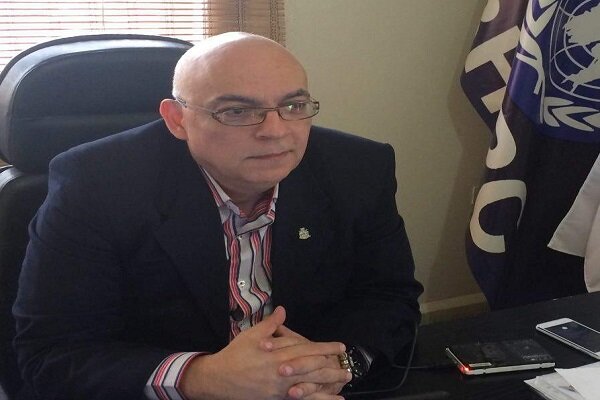TEHRAN - The International Commissioner for Human Rights in the Middle East (West Asia) says that Israel considers war crimes part of its strength and permanence.
"Israel's existence is based on murder, assassination and committing major crimes, and it does not need any reason to justify its acts against humanity because it considers war crimes a sign of strength and permanence," Ambassador Haitham Abu Said tells the Tehran Times.
"Israelis believe that war crimes give them a kind of advantage over the rest of the surrounding countries,” he adds.
The United Nations human rights council is studying whether Israel's recent attacks on the besieged Gaza Strip, that killed more than 250 Palestinians, constitute "war crimes" if they are shown to be disproportionate.
The UN officials said they had seen no evidence that civilian buildings in Gaza, hit by Israeli fighter jets, were being used for military purposes.
The 11-day offensive on the Gaza Strip, which began on May 10, killed at least 253 Palestinians, including 66 children, and wounded more than 1,900 people, according to the Health Ministry in Gaza.
Following is the text of the interview:
Q: Why does Israel commit war crimes once in a while? Who gives Israel the green light to destroy Palestinian homes?
A: Israel's existence is based on murder, assassination and committing major crimes, and it does not need any reason to justify its acts against humanity because it considers war crimes a sign of strength and permanence.
However, it is necessary to point to some facts that are behind its crimes in order to reveal the essence of its illegal actions because Israelis believe that war crimes give them a kind of advantage over the rest of the surrounding countries.
They consider occupation as a right endorsed by Western powers who want to advance their policies in the region by means of Israel.
The Israeli regime today is concerned about its existence today, and therefore it increases its terrorist acts to block the path the resistance represented by some Arab resistance parties, on top of which is the Islamic Republic of Iran.
From here, it is necessary to emphasize the importance of the Iranian role in supporting those rightful forces in regaining their lands that were stolen by Israel since 1948.
Q: Can you update us about the efforts of the United Nations in dealing with the Palestinian-Israeli conflict?
A: First, we will address the emergency meeting of the International Commission for Human Rights requested by Ambassador Nazhat Shameem Khan (President of Human Rights Council), where we laid down basic points of demand in order to contain the Israeli attacks.
We insist that a meeting of the Security Council should be held in order to condemn the military actions carried out by Israel against the Palestinian people.
We have also scheduled for discussion with The Organization of Islamic Cooperation (OIC) and the League of Arab States, to be reflected at the Security Council meeting.
Also, we are invited, after a couple of days, to meet with the President of the International Human Rights Council, Ambassador Khan, to discuss seriously with member states and observers to find mechanisms to enforce the laws issued by the United Nations General Assembly.
Q: U.S. President Joe Biden has said that there will be no peace "until the region says, unequivocally, they acknowledge the right of Israel to exist as an independent Jewish state." However, Israel refuses to recognize a Palestinian state. What is your comment?
A: Regarding any proposal that can be adopted with the Israeli regime and the peace process, we need consensus between the Arab and Islamic countries, which provide major support to Palestine.
In this way, frankly, we face very big challenges.
The Israeli regime has not been responsive even in the minimal proposals that were presented to it in the past, and we do not know whether it will cooperate with the global community today, especially since the parties supporting it are still evading the solutions presented.
Q: How do you evaluate the confrontation between the Palestinian resistance and Israeli forces, especially as the West has been trying to present the resistance as terrorism and been working to prevent the resistance to become strong militarily?
A: The Palestinian resistance showed a very high ingenuity in managing the military operation despite the superiority of the Israeli equipment, and it received great admiration even by the Western public who adopted positions that were not expected, and this is due to the wonderful scene that was created by the different Palestinian classes.
We do not believe that most countries at the core of their consciences consider the Palestinian resistance as a terrorist group.
The resistance should continue its mission within a self-defense act to attract international support.
Q: Israel attempts to portray Iran as a threat to the Arabs and the region. Given the wars waged by Israel and the crimes that it has committed against Arabs and Muslims, who is the real threat?
A: When any political player collides with concrete obstacles to its project, it begins to find the reasons and allies to abort the success of the hostile party, and this is the case of the Israeli regime.
We will say it frankly that the lethargy and reluctance of some Arab countries to adopt their responsibilities towards Palestine as a central cause has pushed the Palestinians to search for a diverse source to achieve their goal in restoring their lands and rights, so Iran is a haven for them.
As for the threats to Arabs, we do not have the right to compare the Israeli regime that usurped all kinds of Arab rights with a country that has made every effort to support Palestinian.
TAGS


No comments:
Post a Comment